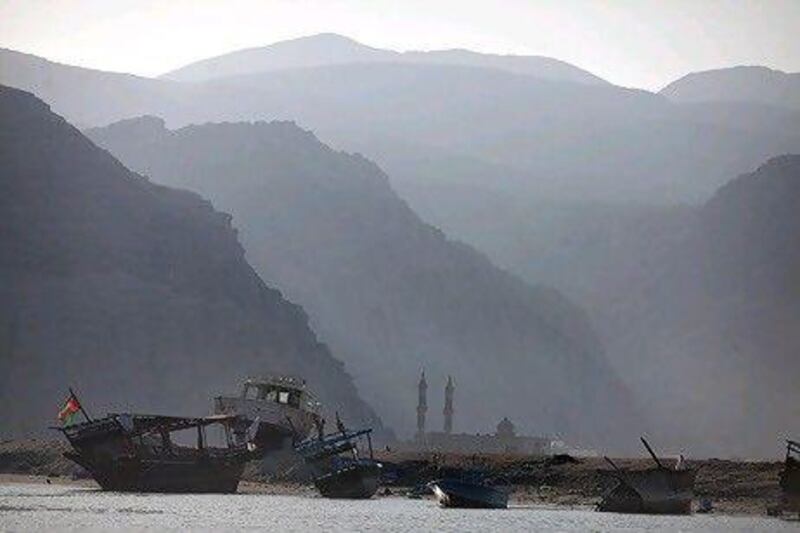SHARJAH // Authorities have tightened up the border rules at Dibba, making it harder for outdoors enthusiasts to cross into Oman’s Musandam Peninsula.
Hundreds escape the city life of Dubai and Abu Dhabi in the hills of Musandam to camp, hike or climb, especially in cooler months.
Sharjah authorities at the unofficial border crossing at Dibba have been demanding that UAE residents present proof of a hotel stay or booking with a dhow operator to enter Oman. They say they are enforcing a Ministry of Interior directive.
Residents must also send a copy of their passport and visa to the hotel at which they will stay. Those who book with dhow and dive companies must send details 48 hours in advance.
All of this makes it difficult for day-trippers to make spontaneous trips to the Omani enclave.
Pete Aldwinckle, who has been rock climbing in the region for the past nine years, said it had made him and his friends think twice about crossing the border.
“It’s a positive lifestyle decision instead of going to have a brunch,” Mr Aldwinckle said. “It’s a playground out there for outdoor activities no matter what you’re into, and it’s world-class in some cases, and this uncertainty is putting people off.”
Amy Subaey, the organiser of UAE Trekkers, said her group would no longer arrange hikes into Dibba after the red tape she had encountered.
Trekkers usually spend the night camping. Now they must book and pay for a hotel breakfast the next morning to provide proof for police.
Ms Subaey said getting all of the passport copies and money for the hotels made it too much work.
“A lot of people didn’t believe me at first,” she said.
On her group’s last trip, before the rules were properly implemented, eight Indian nationals were refused permission to leave the UAE.
They had a hotel booking but not the right paperwork, something Ms Subaey did not know was required.
She said UAE Trekkers probably would not offer another trip to the area until next year.
View Dibba border crossing in a larger map
Mr Aldwinckle said there were about 60 rock climbers who regularly went through the Dibba crossing, but as the months became cooler more would be affected by the new rules.
“It’s the uncertainty,” he said. “Will I get up at 3am to drive to get on a crag at 5am for first light or will I be sitting at home eating toast? It’s really difficult to know the rules.”
Businesses in Oman are also feeling the effects and have had to deal with extra paperwork.
“It’s affecting business tremendously here,” said Tarek Khalil, general manager of Al Marsa Musandam, a dive and dhow operator.
“We have all the diving centres, travel agents, the Six Senses Resort … those businesses work on bookings and reservations and walk-ins.”
But foot traffic has all but vanished and only those who hold tourist visas are exempt from the rules.
Mr Khalil said that when bookings came from UAE residents, he asked for scanned copies of their passports and residency visas.
“We take it from there,” he said.
Companies must give an official letter with the names and origins of their guests to Dibba police station.
Mr Khalil said this was to ensure visitors had no legal problems or holds on their passports. Two days later, the police grant approval, and stamp and sign the letter. He sends a photocopy of the approval letter in case the original goes missing at the border.
“Visas are not required, so why are they making our businesses so difficult?” Mr Khalil said.
Lisa Schwaiger, marketing manager at Sheesa Beach dhow cruises and dive centre in Dibba, said it was irritating for customers who had to scan their passports, especially if they were booking for a large group.
“We can’t accept last-minute bookings, and some of the customers don’t want to send to copies of their passport and visas as they are private documents,” Ms Schwaiger said.
“Our customers, like Asian people, Indian people, they don’t have a chance but if they’re white they’ve a 50 per cent chance of getting over [with no booking]. Some take the chance and get in.”
Representatives from the Omani ministry of tourism were not available for comment.
eharnan@thenational.ae






